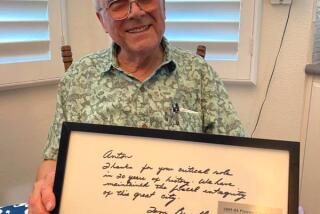Dallas Williams; Radio Ad Man, Lawmaker
- Share via
Dallas Mason Williams, whose voice was heard in such disparate places as the dignified corridors of government and on the air as the zany Culligan Man of radio commercial fame, has died of cancer.
Williams, a onetime Burbank city councilman and mayor who later headed the Southern California Assn. of Governments, was 72 when he died of cancer Tuesday at his home in the Hollywood Hills.
With Stan Freberg, Williams was one of the first to equate comedy with commercials, bringing jocular characters to radio who coincidentally promoted the wares of Firestone, Arrowhead, Culligan and others.
His first successful ad was in the 1950s for Firestone, in which a woman driver speeds into a parking lot to the sounds of tearing metal and breaking glass.
She has destroyed her car because of faulty brakes. The parking lot attendant advises that she should have visited her Firestone store for a low-cost brake inspection. She belatedly decides that she’ll follow his advice and he answers darkly: “Sure lady, I’ll put it (the car) in a sack for you.”
Williams’ independent production company also created the befuddled “Boss, This Is Whitney” character, a dim-witted Arrowhead driver whose misadventures on his daily water delivery route drove his supervisor to distraction.
For Culligan, Williams not only wrote the copy, but he and his late wife, Jean, also provided the voices of the two characters.
The radio spots for the water softener company featured a gentle, encouraging and paternal Williams trying to provide solutions to water problems for a sometimes shrill, always excitable housewife.
He would keep reminding her to “call the Culligan Man” and the commercials would end with her bellowing “Hey, Culligan Man!” Conceived for radio, the campaign moved to television with cartoon characters.
Williams served on the Burbank City Council from 1956 to 1967, twice as mayor, and was founding president of SCAG in 1963, when city councilmen and supervisors from throughout Southern California banded together to study mutual problems.
He also was named by Gov. Edmund G. (Pat) Brown to the State Coordinating Council on Urban Policy.
Williams began in radio while attending the University of Washington and, after serving in the Army during World War II, he came to Burbank, where he became a broadcaster and later a producer of commercials.
Among his awards were the Clio, which is given for imaginative and effective commercials. In 1988 he received the Southern California Broadcasters Assn. Career Achievement Award.
Survivors include his wife, Gaye, and two sons. Contributions in his name may be made to the Wellness Community in Santa Monica.
More to Read
Sign up for Essential California
The most important California stories and recommendations in your inbox every morning.
You may occasionally receive promotional content from the Los Angeles Times.













